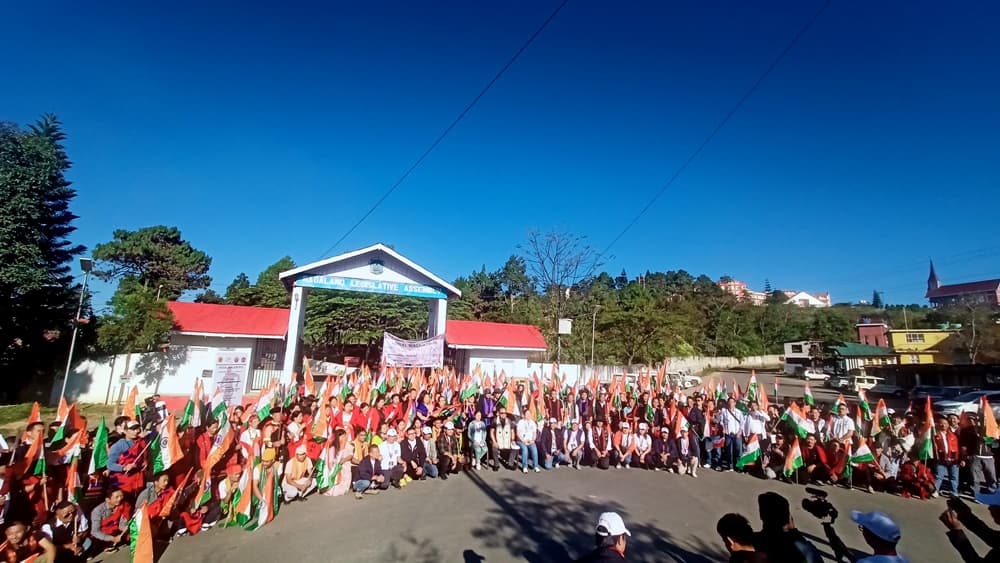Hundreds joined a walkathon in Kohima marking Birsa Munda’s 150th anniversary and celebrating tribal pride and unity.
Share

DIMAPUR/KOHIMA — A Tribal Walkathon was held from the Nagaland Civil Secretariat to the Nagaland Legislative Assembly Gate, Kohima, on Saturday to mark the culmination of the Janjatiya Gaurav Varsh Pakhwada 2025.
Advisor for Tribal Affairs and Election H Tovihoto Ayemi attended the event as the guest of honour and flagged off the walkathon.
Addressing the gathering, Ayemi said the Janjatiya Gaurav Varsh Pakhwada and the Tribal Walkathon mark the celebration of the 150th birth anniversary of Bhagwan Birsa Munda, a tribal freedom fighter of India.
He said the event is being held across the nation and holds significance as it marks Munda’s 150th birth anniversary.
Expressing his delight over the large participation of tribal representatives, Ayemi highlighted that Nagaland, with nearly 100% tribal population, stands in contrast to India’s tribal population of about 8–9%, amounting to nearly 105–106 million people.
He said, “India is a very diverse nation, and we (tribals) contribute a good portion of the population. We, as tribals, have contributed in so many ways — in culture, music, arts, tradition, craftsmanship, and many other areas of nation-building, positively.”
The advisor said the nation always remembers the contributions made by tribal communities.
Also read: Back-to-back AI launches: Sitharaman unveils Dimapur Future Skills Centre
'Caution is conscience': Nagaland media told to protect children, not headlines
He highlighted that among the numerous tribal heroes in India, Munda is revered as one of the greatest, having stood for rights and fought against injustice and exploitation under colonial rule. He said, “Today, we remember him for the contribution he made for the freedom of India and for the growth, development, and building of this great nation, India.”
Angelina Tajen, secretary of the Tribal Affairs, delivering the keynote address, stated that Munda’s legacy reminds people of the contributions of tribal communities to nation-building, culture, and heritage.
She added that the walkathon is not just a physical journey but a symbolic one — a journey of unity, pride, and resilience — and a celebration of the rich traditions, vibrant culture, and spirit of tribal communities.
Tajen further stated that the occasion is also a call to action, urging everyone to work together for the socio-economic development and empowerment of tribals, ensuring that their voices are heard and contributions recognised.
Around 450 to 500 participants from 18 tribes of Nagaland took part in the walkathon.
Following the walkathon, a Tribal Cuisine Competition and an exhibition of tribal paintings were organised at the DUDA Conference Hall, Kohima. The cuisines were judged by Asano Angami, senior chef at Niathu Group, and Chenti Phom.
The exhibition featured artworks by local artists, highlighting diverse indigenous themes.
Joint Secretary of the Tribal Affairs, TL Kiusumong Tikhir, handed over the prize to the winners of the cuisine competition. The Khiamniungan tribe secured first place, while the Phom and Konyak tribes took the first and second runner-up positions, respectively.
Meanwhile, the Office of the Deputy Commissioner (DC), Kohima, led by DC B Henok Buchem, joined the live streaming of Prime Minister Narendra Modi’s address from Dediyapada, Gujarat, and simultaneously observed the Janjatiya Gaurav Varsh celebrations at the DC Office on Saturday.
Speaking on the occasion, Buchem highlighted the significance of Janjatiya Gaurav Varsh, describing it as a day dedicated to honouring tribal pride and celebrating the legacy of Munda. Emphasising the need for cultural preservation, he noted that modern lifestyle influences often dilute traditional values.
“Sometimes we are unaware of how our lifestyle has mixed with Western culture, and even our children become confused,” the DC said. He urged parents to prioritise teaching their children their own dialects at home, especially in families with mixed linguistic backgrounds.
He cautioned that many young people today struggle to participate in church or community programmes because they are unfamiliar with their mother tongues.